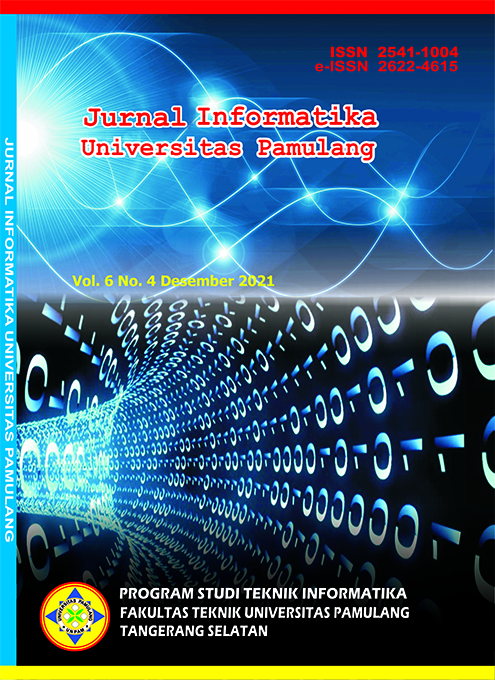Sistem Pendukung Keputusan untuk Menentukan Pemberian Beasiswa Menggunakan Metode Simple Additive Weighting (SAW) pada Sekolah MTs Mathlaul Anwar
DOI:
https://doi.org/10.32493/informatika.v6i4.12720Keywords:
SPK, SAW, ScholarshipAbstract
Scholarship means an assistance given to individuals (students) which aims to be used for the continuation of the education taken. Every year, MTS Mathlaul Anwar provides scholarships to outstanding students. The current selection of scholarships, which is still done manually, makes schools need to determine a clear way of calculating which students get the right scholarships so that the scholarships given are right on target. Therefore, a Decision Support System (SPK) application is designed which is expected to be able to determine scholarship recipients according to the qualifications determined by the school. SPK is expected to help select scholarship recipients. The existence of the proposed SPK can help schools in the selection process for scholarships easily, quickly and accurately. In this study, the author uses the Simple Additive Weighting (SAW) method which can provide assessment results based on each weight on each scholarship award qualification. The criteria for awarding scholarships are the value of knowledge, the value of skills, activeness in school activities (ex-curricular activities), attendance and morals. By making a decision support system by applying the SAW method, it is easier for schools to determine students who get scholarships. Of the five selected scholarship recipients, student D was found to be in the first rank with a result of 14.25.
References
Firman, A., Wowor, H. F., Najoan, X., Teknik, J., Fakultas, E., & Unsrat, T. (2016). Sistem Informasi Perpustakaan Online Berbasis Web. E-Journal Teknik Elektro Dan Komputer, 5(2), 29–36.
Fitria. (2016). Sistem Penunjang Keputusan Decision Support System (DDS). Journal of Chemical Information and Modeling, 53(9), 1689–1699.
Hidayat, R. (2017). Sistem Pendukung Keputusan Penerima Beasiswa Murid Berprestasi dengan Metode Simple Additive Weighting. Jurnal Sisfotek Global, 7(2), 13–17.
Kusnadi, Y., & Dwiyansyah, M. W. (2020). Sistem Pendukung Keputusan untuk Penerimaan Beasiswa dengan Metode Simple Additive Weighting ( SAW ) Pada Smkn 1 Ciomas Kabupaten Bogor. 6(1), 120–131.
Liesnaningsih, Taufik, R., Destriana, R., & Suyitno, A. P. (2020). Sistem Pendukung Keputusan Penerima Beasiswa Berbasis WEB Menggunakan Metode Simple Additive Weighting (SAW) pada Pondok Pesantren Daarul Ahsan. Jurnal Informatika Universitas Pamulang, 5(1), 54. https://doi.org/10.32493/informatika.v5i1.4664
Melwin Syafrizal., S.Kom., M. E. (2018). Sistem Pendukung Keputusan (Decision Support System). Sistem Penunjang Keputusan, 11(3), 77–90.
Risdiansyah, D. (2017). Perancangan Sistem Informasi Bimbingan Konseling Berbasis Desktop pada SMA Kemala Bhayangkari 1 Kubu Raya Deni. Khatulistiwa Informatika, V(2), 86–91
Situmorang, B. H., & Hafityani, I. (2018). Penerapan Fuzzy Multiple Attribute Decision Making (FMADM) dengan Metode Penjumlahan Terbobot (Simple Additive Weighting ) untuk Menentukan Siswa Berprestasi Terbaik. 3.
Sugiyono.(2017). Metode Penelitian Kuantitatif, Kualitatif, dan R&D. Bandung:Alfabeta, CV.
Taufiq, R. (2018). Sistem Pendukung Keputusan. Jakarta. Mitra wacana Media.
Downloads
Published
Issue
Section
License
Authors who publish with this journal agree to the following terms:
- Authors retain copyright and grant the journal right of first publication with the work simultaneously licensed under a Creative Commons Attribution-NonCommercial 4.0 International (CC BY-NC 4.0) that allows others to share the work with an acknowledgement of the work's authorship and initial publication in this journal.
- Authors are able to enter into separate, additional contractual arrangements for the non-exclusive distribution of the journal's published version of the work (e.g., post it to an institutional repository or publish it in a book), with an acknowledgement of its initial publication in this journal.
- Authors are permitted and encouraged to post their work online (e.g., in institutional repositories or on their website) prior to and during the submission process, as it can lead to productive exchanges, as well as earlier and greater citation of published work (See The Effect of Open Access).
Jurnal Informatika Universitas Pamulang have CC-BY-NC or an equivalent license as the optimal license for the publication, distribution, use, and reuse of scholarly work.
In developing strategy and setting priorities, Jurnal Informatika Universitas Pamulang recognize that free access is better than priced access, libre access is better than free access, and libre under CC-BY-NC or the equivalent is better than libre under more restrictive open licenses. We should achieve what we can when we can. We should not delay achieving free in order to achieve libre, and we should not stop with free when we can achieve libre.
Jurnal Informatika Universitas Pamulang is licensed under a Creative Commons Attribution-NonCommercial 4.0 International (CC BY-NC 4.0)
YOU ARE FREE TO:
- Share : copy and redistribute the material in any medium or format
- Adapt : remix, transform, and build upon the material for any purpose, even commercially.
- The licensor cannot revoke these freedoms as long as you follow the license terms





